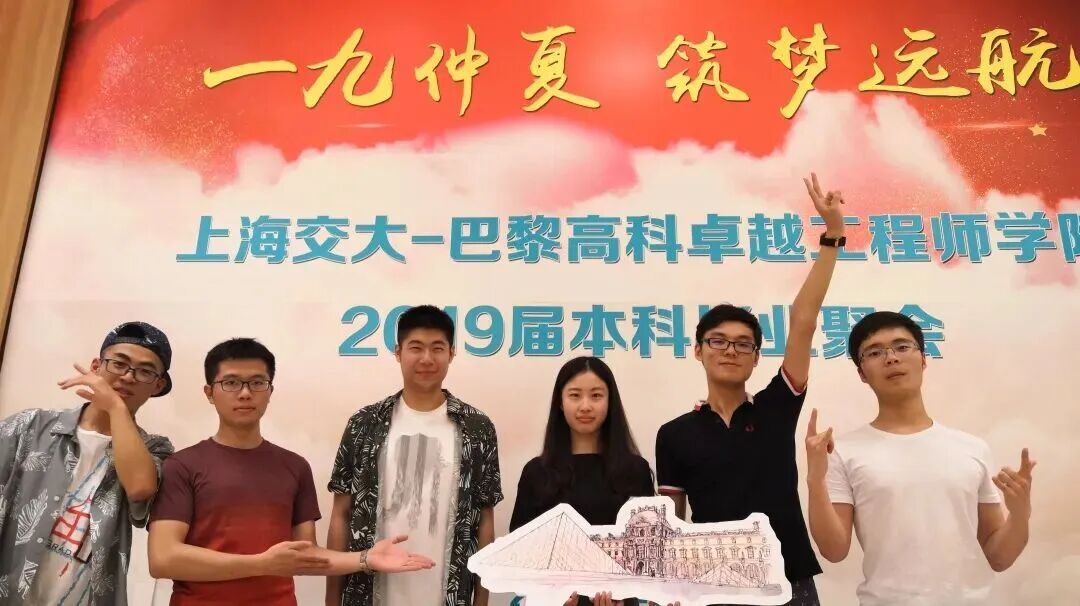
Editor's Note from SPEIT:
From the banks of the Huangpu River to the banks of the Seine, from industrial sites to the United Nations stage, alumni of the SJTU Paris Elite Institute of Technology have charted diverse life trajectories under the banner of "Excellent Engineers" in the global coordinate system.
Choices have no standard answers, but excellence always resonates. The "Excellence in the Workplace" series will invite alumni (and students) from different cohorts and fields to share their logic in career (internship) choices, cross-boundary breakthrough experiences, and how they transform the dual cultural genes of China and France into core competitiveness. Their stories hold the "growth code" for the new generation of excellence-oriented engineers.
In this installment, Bao Rongzhou, a master's graduate of the class of 2022, will share his employment story.


Personal Profile
Name: Bao Rongzhou
Major: Information Engineering + French
Graduation Year: 2022
Overseas Study Experience: Exchange Program at MINES ParisTech
Employment Unit and Position: Shopee&Monee Risk Control Strategy (Brazil Market)
Shopee & Monee are subsidiaries of Sea Limited, founded in 2009 and headquartered in Singapore. The group operates across Southeast Asia, Latin America, and multiple countries worldwide, dedicated to driving connectivity and growth through technology. Sea Group's core businesses span three major sectors: digital entertainment, e-commerce, and internet finance, delivered through its platforms Garena, Shopee, and Monee respectively.
✦ Gratuate Student Story:
Alumni Story
✦
1
1. What work experience have you gained since graduating from SPEIT? How has this experience influenced your career development?

My career journey began at Ant Group, then ByteDance, and now I'm deeply rooted in Shopee & Monee. While these steps may seem disjointed, they follow a clear trajectory that has shaped and solidified my career path: evolving from technical execution to business-driven roles, creating core value within rapidly expanding international operations.
In the early days at Ant Group and ByteDance, I sought cross-functional experience spanning algorithms, strategy, and marketing. This journey gave me a systematic grasp of the entire fintech business lifecycle, transforming me into a versatile professional. This experience clarified that I preferred seeing tangible business outcomes over pure technical research.
My decision to join Shopee & Monee represents the execution of this career trajectory. Driven by curiosity and a desire to challenge myself, I chose to experience the decision-making and challenges inherent in scaling a business from 1 to 10 within a new market landscape. Shopee is now on the path of—“from e-commerce to payments to credit”—in the Brazilian market. This field provides an ideal stage for me to apply my past experience and collaborate with the team to drive this business forward.
2
What position do you currently hold at Shopee&Monee? What is the work pace and environment like?
I am currently responsable for the risk control strategies for the Brazilian market at Shopee & Monee. My core responsibilities involve leveraging credit user data from the Brazilian market to establish appropriate credit limits, pricing, and eligibility criteria. The ultimate goal is to ensure stable growth in Monee's credit and payment services while maintaining consistent risk management. Regarding work pace, it can be summarized as “balancing the challenges of a startup phase with the potential of an international environment.” The current workload is a bit substantial, as Monee is in a critical expansion phase. However, the overall company culture is excellent—we enjoy 15 days of annual leave, and with a multinational team structure, we maintain a good work-life balance, fostering a more sustainable and healthy work environment.
3
How has your engineering background contributed to your growth in the internet industry?
The core advantage my engineering background brings is a pragmatic mindset of “grounded problem-solving.” In the internet industry, especially on the front lines of business operations, even the most perfect blueprint must be translated into concrete execution details. Challenges often arise during implementation, and engineering training hones our thinking to focus on “how to make it happen.”
For instance, in risk control operations, the key isn't merely proposing a complex model, but precisely answering concrete questions like: “Who are our users? Why do they use our product? What is the source of their repayment capacity?” It's akin to clearly distinguishing whether a user needs “tissue paper” rather than “shampoo.” Focusing on these actual needs enables the design of viable solutions that ultimately drive tangible growth in business metrics. This ability to solve real-world problems is the key to how engineering graduates build their value proposition in the internet sector.
4
How did your learning experience at SPEIT help you in your multinational work?

包容洲(左三)在校期间
SPEIT's experience has provided us with an international perspective and collaborative skills that are invaluable assets in today's multinational work environment.
We were immersed in a cross-cultural learning environment early on, training us to instinctively understand how to communicate and collaborate effectively with colleagues from diverse cultural backgrounds. When I need to work with teams in Brazil, Singapore, and other locations, I realize this skill isn't universal—yet we SPEIT students can integrate smoothly.
The future business world is destined for global collaboration. Regardless of your company, cross-border communication will become increasingly commonplace. The experience at SPEIT not only equips us with multilingual skills but also instills an “instinct” for cross-cultural cooperation. This gives us a unique competitive edge when expanding into new markets and learning from global best practices.
5
What advice would you give to SPEIT's students currently job hunting or seeking internships to help them find their career direction?
My core advice is: Keep your eyes on the long-term, don't get bogged down by short-term compensation, and leverage your unique strengths.
First, dare to desensitize yourself to initial salary offers. People tend to overestimate changes within two years while underestimating achievements five years down the line. True direction stems from pursuing long-term value, not minor differences at the starting line.
Second, proactively explore and become a T-shaped professional. Leverage your time in school and internships—like I did at ByteDance—to actively engage with different aspects of the business and broaden your horizons. This will help you discover your true passions: whether you lean toward technical depth or, like me, enjoy the comprehensive impact of business operations.
Third, maximize the international advantages that SPEIT has instilled in you. When job hunting, prioritize companies with a global vision and operations—they truly offer the stage where you can maximize your value and find your direction fastest. Remember, those willing to invest more time cultivating a single area and leveraging their unique background will ultimately achieve growth beyond expectations.
Finally, I'd like to share a poem with students at SPEIT:
Live not for battles won.
Live not for the-end-of-the-song.
Live in the along.
Let this poem inspire us all!
SPEIT Editor's Note:
The career development journeys of Bao Rongzhou vividly demonstrate how an international background empowers SPEITers professionally.
McKinsey & Company's latest survey report reveals that in the context of globalization, going global has become a strategic imperative for enterprises. Currently, revenue from non-domestic markets already accounts for 30%-40% of some leading Chinese companies, while this proportion can reach 80% among mature globalized enterprises. Chinese companies still possess immense potential for overseas expansion.
From a regional perspective, Chinese enterprises' overseas expansion exhibits four major trends:
· Southeast Asia: Has been the primary destination for China's outward investment since 2018;
· Middle East: Chinese companies continue exporting production capacity and technology to the region while establishing deep cooperation with multiple countries;
· Europe: High-end industries, particularly renewable energy, are rapidly expanding into the region, creating new growth engines;
· Africa: Developes rapidly and holds immense potential.
Students at SPEIT thrive in a naturally international learning environment, enabling them to prioritize cross-cultural competency development throughout their studies and future careers. They actively engage with global corporate sectors, fully leveraging and amplifying the international advantages SPEIT provides.







